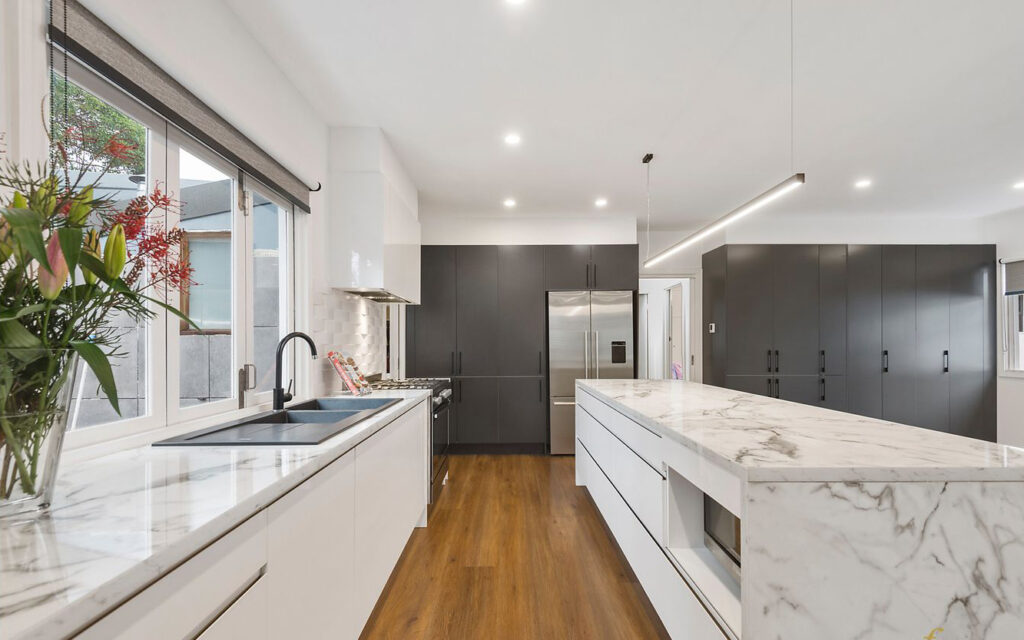Not only do benchtops have a big impact on the overall look, it’s also the hardest working surface in your kitchen, so durability is a big factor. Here’s a rundown of the best kitchen benchtop materials and a comparison of their pros and cons.
Engineered stone benchtops
This is the most popular choice of benchtop material for kitchen renovators. Made using natural aggregates mixed with resins, it comes in a wide range of colours, from bright whites to dark greys. You can choose either a solid colour or have flecks of different-coloured stone through it to add interest. The non-porous surface resists staining, scratching and doesn’t need any ongoing maintenance.
Laminate benchtops
If you are on a tight budget then laminate material is right for your wallet. However, this doesn’t mean you have to compromise on looks. Laminate comes in a variety of colors and designs following more expensive materials like wood, stone, and even concrete. You can get the benchtop you want without paying a hefty price tag. Laminates are resistant to stains and are easy to keep clean but are prone to scratches and scorching, so always use a cutting board and be careful with hot pots and pans.
Timber benchtops
You can bring a touch of warmth and character to your kitchen with timber when you’re using colder materials like glass and stainless steel elsewhere in the kitchen. The wide variety of available species means you can go light with the yellowish colours of ash or contrast light-coloured doors with the darker tones of walnut. Wood needs to be coated with food-safe oil or polyurethane for protection. The oil needs to be reapplied every year or so to remain effective.
Solid surface
Solid surface is an acrylic resin with alumina filler. The joints between each part of the benchtops are not visible after installation, so it looks like a large slab of stone. You can also place the molded sink against the benchtop so that there is no room for dirt to collect, making it easier for you to keep it clean. It’s also UV resistant, so is the perfect choice for an outdoor kitchen which is so popular these days. Another advantage is that the solid surface is repairable. Severe damage such as heat scorch can be repaired by the manufacturer without replacing the entire benchtop.
Stainless steel benchtops
Stainless steel- every chef’s favorite material can also be the texture you need to balance out your palette. Heat resistant and hardwearing, it can be upholstered on worktops and island benches, formed seamlessly into the kitchen sink and back, and also used for kitchen counters.
Polished concrete benchtops
Add a rough contrast to wood or laminate by using concrete on the benchtop, on the wall as a cool background to open shelves or as an island. Just like stone, concrete requires sealing and careful handling.
Marble benchtops
Marble is a gorgeous, natural stone that is commonly used in kitchens as a benchtop and splashback material. It’s a timeless and sophisticated option but it comes with an eye watering bill and substantial upkeep. Though it’s surprisingly porous and will soak up spills like a sponge, damaging the look of your investment, there are plenty of ways keep marble looking clean and brand new.
Granite benchtops
Granite creates a delicate and durable surface for your benchtop. However, you will need a significant budget – it is considered the second most expensive material after marble. In return, granite has many designs and colors suitable for all architectural styles. Granite is also incredibly durable, making it perfect for benchtop. To clean granite, simply use warm water and soap to help keep the stone’s luster.
Porcelain benchtops
Porcelain desks are becoming increasingly popular due to their durability, versatility, and affordable price. They can withstand high heat, scratches and stains and their low porosity makes them a very hygienic choice
Bamboo benchtops
Bamboo is an eco-friendly and less expensive benchtop material that can match any kitchen style from country to modern. They are usually sealed with oil (which requires frequent reapplication) or with polyurethane (which is more resistant to stains). Fortunately, you can repair any damage caused by re-sanding the benchtop and refinishing it.
VIETNAM BENCHTOP SUPPLIER COMPANY
VTStone is one of the biggest companies in Vietnam in the field of crafting and exporting Vietnam Benchtop
We have a source of high quality natural stone materials. Our professional staff will bring you quality products, good service and competitive prices.
Contact us for advice:
Address : Factory address: Binh An 1 village, Phuoc Thanh town, Tuy Phuoc district, Binh Dinh province.
Website: https://vtstone.vn/
General Info P: +84-931.934.877
Email: [email protected]


